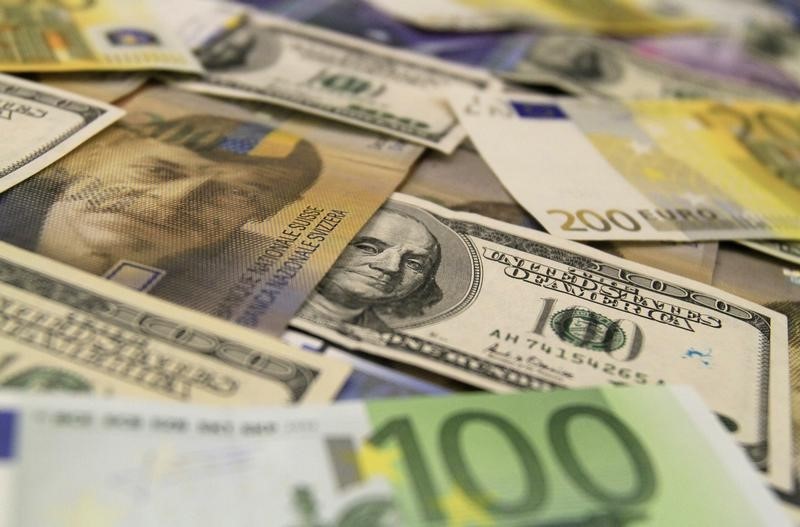* Thai baht hits near 2-week low
* Chinese yuan, Philippine peso, Korean won appreciate
* Singapore dollar capped as Q1 growth slips
(Adds text, updates prices)
By Aby Jose Koilparambil
May 21 (Reuters) - The Thai baht on Tuesday slipped to its
weakest level in nearly two weeks on soft economic data,
underperforming most of its counterparts which were relieved by
Washington's decision to ease some of its restrictions on
Chinese telecoms giant Huawei.
But the underlying tone in markets remained cautious as the
trade war between the United States and China showed no signs of
easing, with the broad impact filtering through to many
economies.
The trade-dependent Thai economy, the latest to show the
effects of the trade tensions and cooling global demand, grew at
its slowest annual pace in more than four years in the first
quarter, hurt by softer exports. Southeast Asia's second-largest economy expanded 2.8% from a
year earlier, missing the 3.0% forecast in a Reuters poll.
The baht THB=TH weakened as much as 0.5% to 31.890 against
the U.S. dollar, though it remains the best regional performer
this year, gaining more than 2%.
"Today's GDP print affirms recent signs that growth in
Thailand is on a clear downswing... Structural weakness in
vehicle demand globally and a cyclical downturn in the
semiconductor sector poses continued external headwinds for
Thailand's manufacturing sector," said Noelan Arbis, economist
at HSBC Global Research, in a note.
Currency markets in Asia took some comfort after Washington
temporarily eased restrictions imposed last week on Huawei, a
move aimed at minimizing disruption for its customers.
The Chinese yuan CNY=CFXS gained by as much as 0.2% on the
day. The currency has fallen about 2.5% since U.S. President
Donald Trump said on May 5 he will raise tariffs on $200 billion
of imports from China to 25% from 10%, deepening a rift between
the two economic superpowers.
Among other gainers, the Philippine peso PHP= and the
South Korean won KRW=KFTC strengthened 0.2% each, while the
Indian rupee INR=IN rose slightly.
The Indonesian rupiah IDR=ID weakened a bit on a day when
incumbent President Joko Widodo was declared winner in last
month's election, amid claims of widespread cheating by
opposition. DOLLAR
The Singapore dollar SGD= was little changed, not helped
by data showing the city-state's annual economic growth slipped
to the lowest in nearly a decade in the first quarter. That
prompted the government to downgrade its full-year growth
forecast. Gross domestic product (GDP) expanded 1.2% year-on-year in
the three months ended March 31, down slightly from the 1.3%
seen in the government's advance estimate and the fourth
quarter's revised 1.3% pace.
The result, which was below the 1.5% growth forecast in a
Reuters poll, marked the slowest annual expansion for any
quarter since April-June 2009.
The following table shows rates for Asian currencies against
the dollar at 0524 GMT.
CURRENCIES VS U.S. DOLLAR
Japan yen 110.150 110.05 -0.09
Sing dlr 1.376 1.3763 -0.01
Taiwan dlr 31.429 31.385 -0.14
Korean won 1193.400 1194.2 +0.07
Baht 31.870 31.72 -0.47
Peso 52.564 52.626 +0.12
Rupiah 14470.000 14450 -0.14
Rupee 69.750 69.74 -0.02
Ringgit 4.184 4.175 -0.22
Yuan 6.903 6.9133 +0.15
Change so far in 2019
Currency Latest bid End 2018 Pct Move
Japan yen 110.150 109.56 -0.54
Sing dlr 1.376 1.3627 -1.00
Taiwan dlr 31.429 30.733 -2.21
Korean won 1193.400 1115.70 -6.51
Baht 31.870 32.55 +2.13
Peso 52.564 52.47 -0.18
Rupiah 14470.000 14375 -0.66
Rupee 69.750 69.77 +0.03
Ringgit 4.184 4.1300 -1.29
Yuan 6.903 6.8730 -0.44
